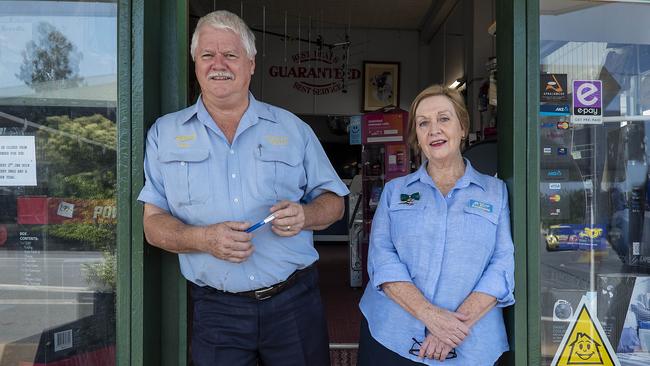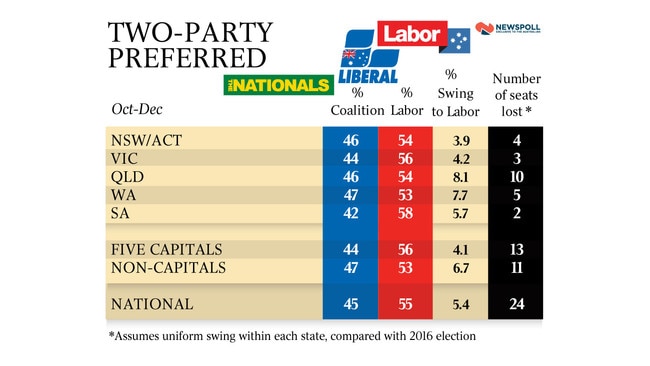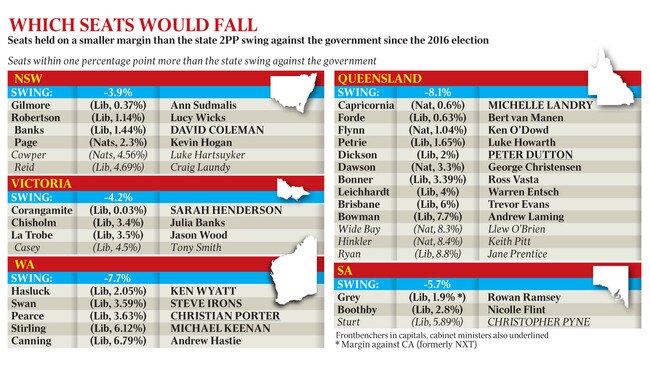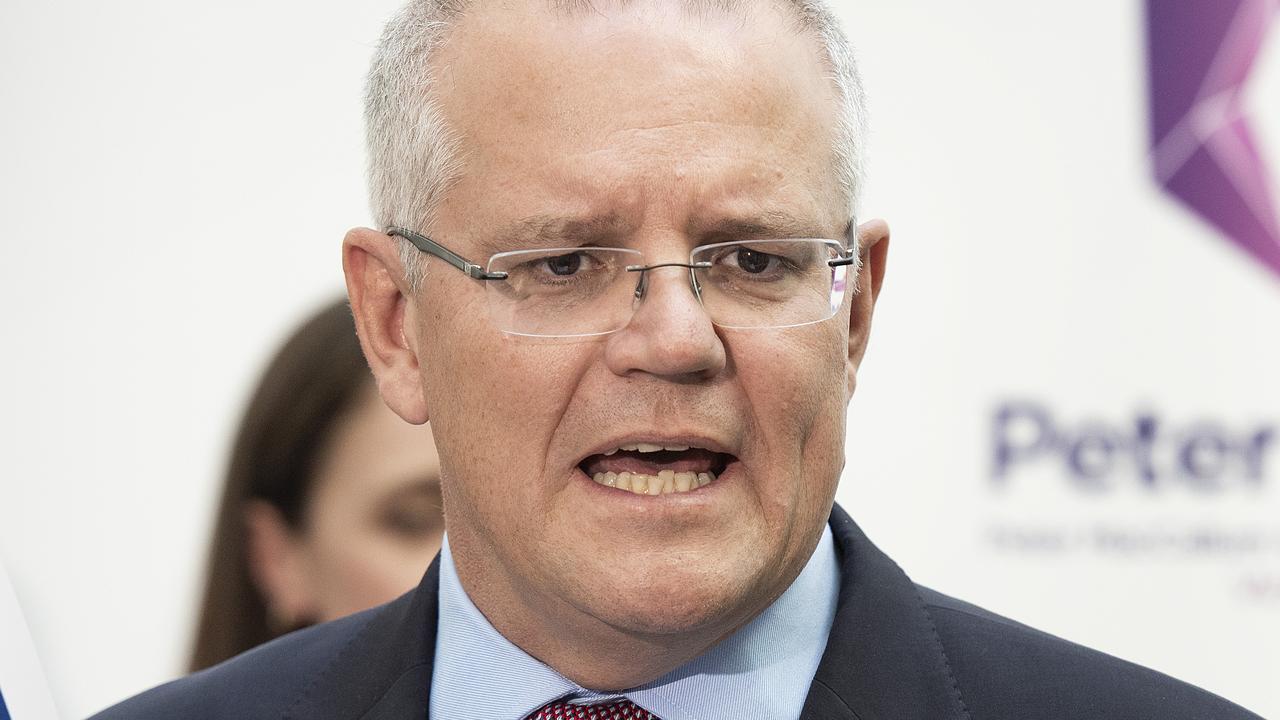Regions fail to embrace Morrison as primary vote stalls
Scott Morrison is failing to bridge the voter gap in regional Australia less than five months before a likely election.

Scott Morrison is failing to bridge the voter gap in regional Australia less than five months before a likely May federal election, suffering a nosedive in personal satisfaction ratings and presiding over a primary vote stalled at 35 per cent, new polling data shows.
A Newspoll quarterly analysis reveals the Coalition has failed to claw back ground from Labor in metropolitan and regional seats across the nation and lags almost 10 percentage points behind its primary vote in non-capital cities at the 2016 election.
In the key battleground state of Queensland, the Liberal National Party sits at 34 per cent primary vote, behind Labor’s 39 per cent, with Pauline Hanson’s One Nation holding steady on 10 per cent.
The Newspoll data prepared for The Australian is based on polls conducted between October 25 and December 9 involving a total of 6896 interviews with voters across Australia. The analysis reveals the government is on track to lose a swath of seats across the nation, with the Coalition trailing Labor on a two-party-preferred vote by 45-55 per cent.
While the Prime Minister commands a nine-point lead over Bill Shorten on who voters consider would make a better prime minister, his net satisfaction rate has retreated into negative territory following a surge in personal support after his elevation to the top job on August 24.

In regional Australia, Mr Morrison’s dissatisfaction rate has hit 47 per cent, compared with 39 per cent who say they are satisfied with the way he is doing his job as Prime Minister. In Queensland, a state that never embraced Malcolm Turnbull as leader, Mr Morrison saw his dissatisfaction levels hit 45 per cent, an increase of five points on the August-October Newspoll analysis. Bill Shorten, who has never been popular in Queensland, picked up a slight increase in personal ratings but 56 per cent of Queenslanders are still not happy with his performance as Opposition Leader.
The latest quarterly analysis suggests the Coalition would lose 24 seats, including six held by frontbenchers, if swings since the 2016 election within each state were uniform.
Ahead of the 2016 federal election, Labor poured significant resources into Flynn, Capricornia and Dawson with an eye to picking up the swing seats by chipping away at the margins of incumbent MPs.
Labor MPs told The Australian they weren’t expecting to win the seats and had concerns over retaining the north Queensland seat of Herbert, which Cathy O’Toole won by 37 votes in 2016. Other Coalition seats that could come under pressure from Labor are Forde, Petrie, Bonner and Peter Dutton’s Dickson.
In Flynn, former LNP supporters have begun looking to alternative options. With unemployment and welfare dependency at high levels in central and north Queensland, voters have turned to minor parties, including One Nation and Katter’s Australian Party.
Robin McGilvery, a former card-carrying Nationals member who now supports One Nation, said he was looking forward to the Coalition’s “annihilation” at the ballot box. The Gayndah business owner said his confidence in the government collapsed following the Coalition’s shift away from Tony Abbott’s agenda. “The Libs are so disappointing. Words can’t describe how angry people are. Turnbull should never have been there. I don’t blame Turnbull for being a left-winger who joined the Liberals, I blame the bed-wetting Liberals for letting him in,” Mr McGilvery said.

The 65-year-old said he hoped that post-election the Coalition would rebuild and move back to conservatism to “distinguish themselves from Labor”.
Grazier Vanessa Bambling of Penwhaupell, said she would stick with the Coalition because she believed it would support business, control immigration and maintain biosecurity. “I’m a real ScoMo lover, but my husband has a different opinion. ScoMo reminds me a bit of John Howard and I was a real Johnny lover, too,” she said.
Ms Bambling, who could not recall Michael McCormack’s name, said the Nationals leadership was failing to cut through the way Barnaby Joyce did before he was brought down by an adultery and nepotism scandal.
In Victoria, where voters swung violently against the Liberal Party at last month’s state election, the Coalition trails Labor 44-56 on a two-party-preferred vote. Off the back of Julia Banks’s defection to the crossbench and a voter backlash over Mr Turnbull’s demise, Labor has hit a primary vote of 44 per cent in Victoria, a seven-point increase on the same quarterly analysis leading into Christmas last year.
The Greens, whose infighting and lack of electoral success have seen the party go backwards in the polls, have sunk to a 9 per cent primary vote in Victoria, more than four points down on the result at the 2016 election. In the marginal Victorian seat of Chisholm, which will likely be won back by Labor after Ms Banks’s defection to the crossbench, the prominent Australian-Chinese community is expected to play a deciding role.
Yuval Xie lives in the electorate with his wife and two daughters, Isabella, 10, and Bella, 2. Mr Xie will be a first-time voter in the next election and intends to cast a ballot for Labor. He thinks sustainable migration and economic development should be first and foremost in the new government’s agenda. “I think something about diversifying society … This society should try to think about the position for different races in this country and about the sustainability of growth,” Mr Xie said.
The Liberals and Labor are running Australian-Chinese candidates, Gladys Liu and Jennifer Yang, at next year’s election. Ms Liu ran the WeChat campaign credited with delivering the former Labor seat to Ms Banks.
Additional reporting: Remy Varga




